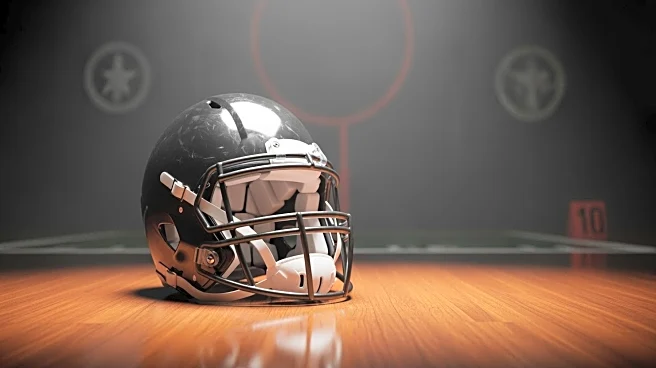What's Happening?
Texas Longhorns quarterback Arch Manning sustained a concussion during the team's overtime victory against Mississippi State. Manning was injured on a 13-yard scramble during the first play of overtime, leading to his exit from the game. Reports from ESPN
and Horns247 confirmed the concussion, which required Manning to receive medical attention in the tent. His backup, Matthew Caldwell, stepped in and threw the decisive touchdown to Emmett Mosley. Manning had a standout performance with 346 passing yards and three touchdowns, rallying the team from a 17-point deficit. Texas head coach Steve Sarkisian has not yet provided an update on Manning's condition, but his availability for the upcoming game against Vanderbilt is uncertain.
Why It's Important?
Manning's injury is significant for the Texas Longhorns as they prepare to face No. 10 Vanderbilt. Manning's performance has been crucial in recent games, and his absence could impact the team's offensive capabilities. The Longhorns are striving to maintain their conference hopes, and losing their starting quarterback could be a setback. Matthew Caldwell, who has experience from previous seasons, will need to step up if Manning is unable to play. The team's ability to adapt to this change will be critical in their upcoming match against a strong Vanderbilt team.
What's Next?
If Manning is unable to play, Matthew Caldwell will likely start against Vanderbilt. Caldwell has experience from his time at Jacksonville State, Gardner-Webb, and Troy, where he demonstrated solid performance. The Longhorns will need to adjust their strategy to accommodate Caldwell's playing style. The team will be monitoring Manning's recovery closely, and his status will be updated once more information is available. The upcoming game against Vanderbilt will test the Longhorns' depth and resilience in the face of adversity.
Beyond the Headlines
Manning's injury highlights the risks associated with high-contact sports like football, where concussions are a common concern. The incident underscores the importance of player safety and the protocols in place to manage such injuries. The Longhorns' handling of Manning's recovery will be closely watched, as it reflects broader trends in sports medicine and athlete welfare. This situation may prompt discussions on improving safety measures and concussion management in college football.
















